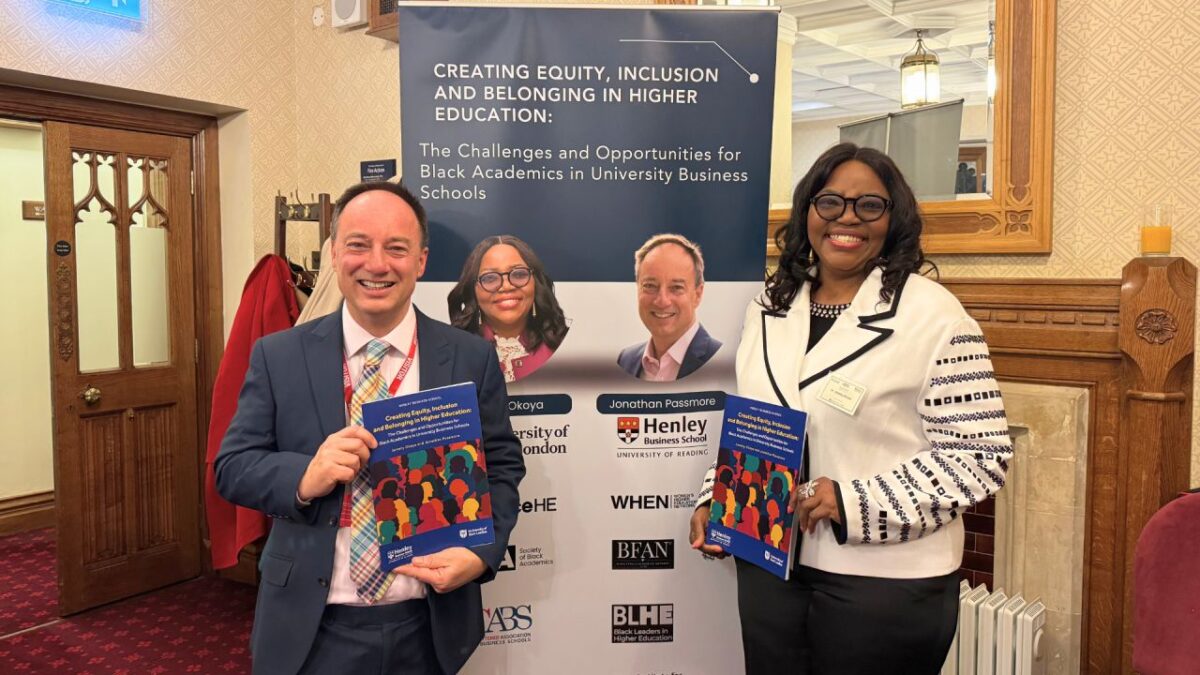Action needed to dismantle systematic barriers faced by Black academics

Systematic and pervasive barriers are hindering the progression of Black academics in UK business schools and more must be done to foster a more inclusive and representative higher education sector, according to a new report co-authored by the University of Reading’s Henley Business School and University of East London.
The groundbreaking report, Creating Equity, Inclusion, and Belonging in Higher Education: The Challenges and Opportunities for Black Academics in University Business Schools, examines the varied experiences of Black academics working in the UK and US, delving specifically into the internal factors that have historically contributed to a lack of career progression, including towards professorship.
Co-authored by Dr Jummy Okoya, Dean of UEL’s Office for Institutional Equity, and Professor of Coaching and Behavioural Change at Henley Business School, Dr Jonathan Passmore, the report calls for radical change at an institutional and individual level, to bridge the gap between Black academics and their peers, and ensure they have every opportunity to thrive and feel a sense of belonging.
The report’s findings highlight significant underrepresentation, with Black academics holding less than 1 per cent of professor roles, despite making up 4.4 per cent of the working-age population. This lack of representation was associated with adverse effects on curriculum diversity, leadership, and student experiences, as well as more widely perpetuating systemic inequities.
In response to the barriers identified, the report proposes a forward-looking BRIDGE – Building Recognisable Inclusiveness, Diverse Growth, and Equity – framework, which advocates for transparent promotion criteria, inclusive leadership, and tailored career programs for Black academics, alongside recommendations for professional bodies and research organisations to embed equitable practices.
Dr Okoya, a UK leader in advocating for more Black female professors and creating a pipeline of Black female PhD students into academia, said: “This bridge model offers a new way to think about career development for Black academics and a pathway towards dismantling existing systemic racial divides. We believe by championing a more inclusive approach, it will encourage people at all levels to join in on the journey to create more diverse academic environments where everyone can succeed.”
The report was launched at an evening reception in the Home Room at the House of Lords in London.
In addition to giving voice to Black academics, Dr Okoya and Professor Passmore engaged with Vice Chancellors, Deans, and leaders of professional bodies, including the Chartered Association of Business Schools, British Psychological Association, Women Higher Education Network and more, across the UK and US, in an effort to foster collaboration and co-create a strategy where all stakeholders have a part to play in creating genuine change in the sector.
Professor Passmore, who has published widely on equality, diversity, and inclusion (EDI), as well as leadership, mindfulness, and coaching added: “We need a step change on this issue if we are to create truly inclusive workplaces. This requires stakeholders across the system to work together, to move beyond ad hoc training and mentoring programmes, to fundamental change across the board from journal review processes to transparency of promotion processes.”
Dr Okoya said, among the key challenges identified in the report were engrained institutional gatekeeping, self-doubt, and psychological strain, which worked in tandem to hold Black academics back from progression.
“These are longing standing issues where obvious solutions have not been pursued but it will take commitment from institutions and leaders in the higher education sector to champion change, including around recruitment and retention practices, on-the-job support tailored to research, teaching and administration, providing mentors and sponsors to help Black academics grow, and being fair, transparent and equitable in promotions to those professorial seats.”
Welcoming the report, Lord Woolley of Woodford, who sponsored its launch at an evening reception at the House of Lords, commended the researchers for taking on the complex issue and providing actionable, common-sense solutions aimed at addressing the barriers faced by Black academics.
“The report is a timely contribution to an incredibly important and ongoing conversation about systematic inequalities and it’s my hope that it will serve as a catalyst for change, to ensure we are supporting the next generation of academic and business leaders, championing role models that reflect our society, and ultimately helping change the face of our universities and board rooms across the UK.”
“The authors have put forward a compelling and actionable path forward to improve the representation of Black academics and it is imperative that leaders in the higher education sector, as well as policymakers heed the call to action.”











Responses